
Another week in football, another VAR controversy to fill the column inches and rile up the fans. If you missed it, Coventry scored a last-minute winner in extra time in a crucial match—an FA Cup semi-final. Only, oh wait—computer says no. VAR ruled Haji Wright was offside, and the goal was disallowed. Coventry fans screamed that the system got it wrong, but no matter. Man United went on to win and dreams were forever dashed.
Systems like the Video Assistant Referee were brought in to make sport fairer, with the aim that they would improve the product and leave fans and competitors better off. And yet, years later, with all this technology, we find ourselves up in arms more than ever.
It’s my sincere belief that technology is killing sport, and the old ways were better. Here’s why.
The Old Days
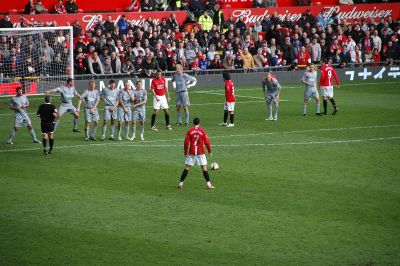
For hundreds of years, we adjudicated sports the same way. The relevant authority nominated some number of umpires or referees to control the game. The head referee was the judge, jury, and executioner as far as rules were concerned. Players played to the whistle, and a referee’s decision was final. Whatever happened, happened, and the game went on.
It was not a perfect system. Humans make mistakes. Referees would make bad calls. But at the end of the day, when the whistle blew, the referee’s decision carried the day. There was no protesting it—you had to suck it up and move on.
This worked fine until the advent of a modern evil—the instant replay. Suddenly, stadiums were full of TV cameras that captured the play from all angles. Now and then, it would become obvious that a referee had made a mistake, with television stations broadcasting incontrovertible evidence to thousands of viewers across the land. A ball at Wimbledon was in, not out. A striker was on side prior to scoring. Fans started to groan and grumble. This wasn’t good enough!
And yet, the system hung strong. As much as it pained the fans to see a referee screw over their favored team, there was nothing to be done. The referee’s call was still final. Nobody could protest or overrule the call. The decision was made, the whistle was blown. The game rolled on.
Then somebody had a bright idea. Why don’t we use these cameras and all this video footage, and use it to double check the referee’s work? Then, there’ll never be a problem—any questionable decision can be reviewed outside of the heat of the moment. There’ll never be a bad call again!
Oh, what a beautiful solution it seemed. And it ruined everything.
The Villain, VAR

Enter the Video Assistant Referee (VAR). The system was supposed to bring fairness and accuracy to a game fraught with human error. The Video Assistant Referee was an official that would help guide the primary referee’s judgement based on available video evidence. They would be fed information from a cadre of Assistant Video Assistant Referees (AVARs) who sat in the stadium behind screens, reviewing the game from all angles. No, I didn’t make that second acronym up.
It was considered a technological marvel. So many cameras, so many views, so much slow-mo to pour over. The assembed VAR team would look into everything from fouls to offside calls. The information would be fed to the main referee on the pitch, and they could refer to a pitchside video replay screen if they needed to see things with their own eyes.
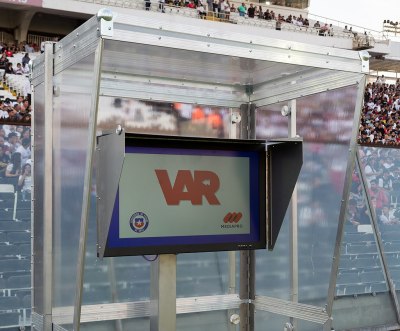
The key was that VAR was to be an assistive tool. It was to guide the primary referee, who still had the final call at the end of the day.
You’d be forgiven for thinking that giving a referee more information to do their job would be a good thing. Instead, the system has become a curse word in the mouths of fans, and a scourge on football’s good name.
From its introduction, VAR began to pervert the game of football. Fans were soon decrying the system’s failures, as entire championships fell the wrong way due to unreliability in VAR systems. Assistant referees were told to hold their offside calls to let the video regime take over. Players were quickly chided for demanding video reviews time and again. New rules would see yellow cards issued for players desperately making “TV screen” gestures in an attempt to see a rivals goal overturned. Their focus wasn’t on the game, but on gaming the system in charge of it.
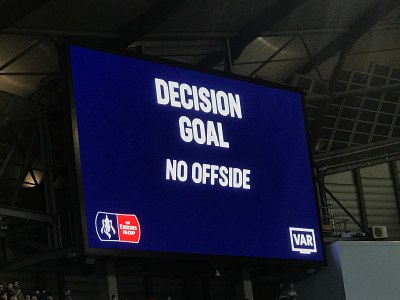
VAR achieves one thing with brutal technological efficiency: it sucks the life out of the game. The spontaneity of celebrating a goal is gone. Forget running to the stands, embracing team mates, and punching the air in sweet elation. Instead, so many goals now lead to minute-long reviews while the referee consults with those behind the video screens and reviews the footage. Fans sit in a stunted silence, sitting in the dreaded drawn-out suspense of “goal” or “no goal.”
The immediacy and raw emotion of the game has been shredded to pieces. Instead of jumping in joy, fans and players sit waiting for a verdict from an unseen, remote official. The communal experience of instant joy or despair is muted by the system’s mere presence. What was once a straightforward game now feels like a courtroom drama where every play can be contested and overanalyzed.
It’s not just football where this is a problem, either. Professional cricket is now weighed down with microphone systems to listen out for the slightest snick of bat on ball. Tennis, weighed down by radar reviews of line calls. The interruptions never cease—because it’s in every player’s interest to whip out the measuring tape whenever it would screw over their rival. The more technology, the more reviews are made, and the further we get from playing out the game we all came to see.
Making Things Right
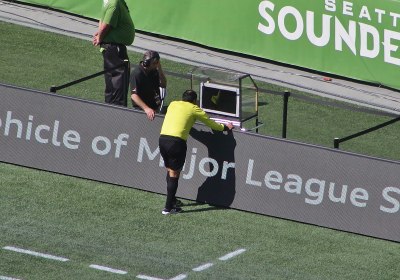
With so much footage to review, and so many layers of referees involved, VAR can only slow football down. There’s no point trying to make it faster or trying to make it better. The correct call is to scrap it entirely.
As it stands, good games of football are being regularly interrupted by frustrating video checks. Even better games are being ruined when the VAR system fails or a bad call still slips through. Moments of jubilant celebration are all too often brought to naught when someone’s shoelace was thought to be a whisker’s hair ahead of someone’s pinky toe in a crucial moment of the game.
Yes, bad calls will happen. Yes, these will frustrate the fans. But they will frustrate them far less than the current way of doing things. It’s my experience that fans get over a bad call far faster when it’s one ref and and a whistle. When it’s four referees, sixteen camera angles, and a bunch of lines on the video screen? They’ll rage for days that this mountain of evidence suggests their team was ripped off. They won’t get over it. They’ll moan about it for years.
Let the referees make the calls. Refereeing is an art form. A good referee understands the flow of the game, and knows when to let the game breathe versus when to assert control. This subtle art is being lost to the halting interruptions of the video inspection brigade.
Football was better before. They were fools to think they could improve it by measuring it to the nth degree. Scrap VAR, scrap the interruptions. Put it back on the referees on the pitch, and let the game flow.

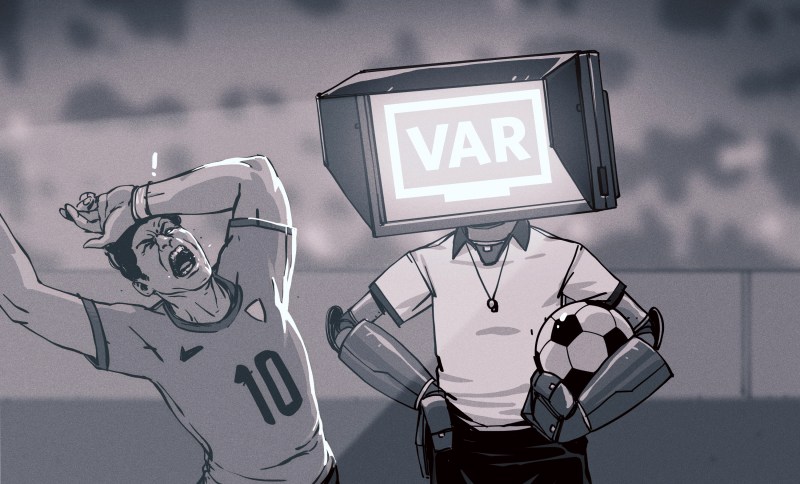














“Always right”+”$$$”==where we are.
One improvement would be to abandon the offside rule. Less chance of judgment errors, more goals, easy fix.
Goal hanging was tedious though. I think VAR ramped up expectations without ramping up outcomes.
Get rid of VAR and bring back the acceptability of some injustice in sport. We were not much worse off before it.
Abandon the offside rule?! But, then, what would people use salt and and pepper shakers for?! ;-)
Or if technology is the hammer of the day, make it realtime and use a laser to project the offside limit line so that it is visible to the players, too.
That leads to teams playing 8+1+1 formations with people just hanging around the opposing goal all the time. It becomes like watching table tennis.
So, better than watching soccer! (Homer: I watched thousands of hours, I almost saw a goal.)
The best part of soccer is the ‘most embarrassing flops’ vids.
Did you see that ludicrous display last night?
The thing about Arsenal is, they always try to walk it in!
Lmao… Jen is still rofl.
Well, that was a bit of a damp squid.
I don’t think it’s valid to say that all such systems are to the detriment of their sport. The way it’s done in rugby seems to work fairly well – the Television Match Official only gets invoked when the on-pitch ref isn’t sure how to call something (usually because there’s a giant pile of players in the way). It does slow the game down but only usually gets used a few times per half rather than every few minutes.
No way the World cup rugby final was RUNIED by VAR he basically called the whole game.
In soccer i agree remove it completely.
The final was a not very entertaining game with or without VAR. Some games just are like that. The best games were in the quarter and semifinals.
I think the way the challenge system and “Hawkeye” (or whatever it’s called at any given tournament) is used in tennis works well and doesn’t appreciably slow the game overall – and I think it improves both the line judge performance and the game itself.
American baseball just uses the system to rate the refs. Refs can call ‘perfect games’ now. Very rare.
We however fail to fire the worst of them. IIRC the very worst was an affirmative action hire, so now can’t be fired, no matter how many times he screws up.
Totally agree with the post. In Argentina it is even worse. Most cameras used for VAR are the same ones used for TV transmissions, this means slower FPS so one frame is offside the next frame it is not and no one knows what really happened. And that is in bigger teams’ stadiums that have many more cameras, imagine what is like on smaller teams’ fields where there are only a few old cameras.
VAR is completely absurd and it is ruining the game.
Mostly agree with the article but I don’t think we can put the genie back in the bottle.
My compromise would be that the referee makes all the calls again, just like it was in the “old days” but both coaches get a button they can press if they want a decision reviewed.
Only big difference over today is that each team’s coach only gets 3 wrong calls in an entire season.
Ask a review when the ref screwed up, well done, hope you do just as well next time.
Waste everyone’s time 3 times by asking reviews that don’t pan out, also fine, but now you’ll live with all the decisions for the rest of the season.
Maybe like volleyball when the team can challenge the refs decision. They have a limit that only gets subtracted when the team is wrong.
What if Coventry won ?
Exactly. Back in 1986, they complained about the hand of God and how the human referee only system was flawed, but when they implement a dedicated system to tackle the very same issues, then it should be stopped when it doesn’t go your way.
The real problem with sport is that it’s all about money, hence why I don’t watch it and am not bothered either way. Surely fixing the corrupt FIFA cartel should be more important than fixing VAR if you are really passionate about sport.
Football fans and players will always complain of a decision, no matter if it is the right or wrong one.
It amazes me that I had to scroll down so much for someone that remembers how it was before the VAR.
How old is the guy that wrote this? He doesn’t seem to have been an adult at a time where there was no VAR.
The first paragraphs of the “OLD DAYS” section are pure fiction and talk about a world that never existed:
* “Players played to the whistle, and a referee’s decision was final. Whatever happened, happened, and the game went on.”
* “There was no protesting it—you had to suck it up and move on.”
* “The referee’s call was still final. Nobody could protest or overrule the call. The decision was made, the whistle was blown. The game rolled on.”
Are these sentences comedy?!
Just to be clear: I’m not trying to say that VAR improved or made the game worse.
It’s just that this text makes no sense and is built upon a fake history. Is he a Coventry fan that had to vent? Maybe don’t let him post next time…
My sentiments exactly.
Socer is still a thing?
Is NFL still a thing?
Makes more than every major soccer org so yeah :v)
What about NBA? haven’t heard of that in ages
Interest in Soccer waxes and wanes in the US around our chances at the World Cup.
It’s a bit complicated here too. (Men’s) Soccer is split between two organizations, MLS and USSF.
MLS runs most of the matches that American (and Canadian) spectators see in person. MLS runs the major league clubs in cities like San Jose, Atlanta, Dallas, Montréal, etc. But USSF has the relationship with FIFA and that’s our internationally facing national team, but most Americans don’t follow them (except when their standing in the World Cup is particularly marketable)
There are no ‘major league’ soccer teams in the USA.
Major league teams draw more than a few thousand fans.
I’ve always felt that systems like this are primarily put in place to protect sports betting, legal or illegal. The amount of money dumped into professional sports is ludicrous and being able to divert that stream in a way that maximizes profits is always going to be implemented somehow. If there’s a question about legitimacy in video reviews then to alleviate allegations simply make ALL the VAR/AVAR video feeds available for review. Then you can set up a secondary or tertiary industry of reviewers for the reviewers.
This one million times.
Any sports fans that think their team gives two craps about them is delusional. Fairness, fun, sport for the viewer are very far down the list of why professional sports exist.
Making as much money as possible for the owners is, and will always be, # 1, 2 and 3 priority.
Since so much money rides on games, we now have computer arbiters.
See the NFL and NBA and everything else in bed with official betting and gambling for example.
In rugby, because the ultimate decision rests with the ref, they put the footage up on the screens in the stadium (and on the TV broadcast), so everyone is looking at the same thing.
Tech is just enhancibg what was already happening anyhow, and it is now just more visible to viewers. And that is money, there is so much money involved that they will do anything to win.
It is just that bribes, drugs and other things are less visible, so you get angry at tech.
it seems like every sport has to decide how to handle the current capabilities of video review, as it improves. i like that ncaa basketball limits how it can be used…so towards the end of the game there can be a lot of drag but for the first 35 minutes it is usually only used if there’s a clock foulup.
i think the real question will be when the tech can do the entire refereeing, when it doesn’t introduce delay for the refs to consult with the tech. it seems like it will potentially be a lot fairer and a lot less intrusive. personally, i am kind of tired of watching the basketball center try to figure out what kind of refereeing they’re seeing today. i see a lot of room for improvement. but i wonder if it won’t still be off-putting somehow. and it will surely inspire some critical thinking about the rules, whether they’re good as written or if they need to be changed to be less obnoxious in the context of perfect enforcement.
I always wondered what was the defining moment in the Dune universe where they started deciding computers shouldn’t be allowed to think for humans and started banning them, and now I know.
There is a prequel by Brian Herbert and Kevin J. Anderson that explains the origin of the Butlerian Jihad. Do not read it. It is awful.
AI-based automagic offside cameras are being installed now, ready for next season in the English Premier League. Some of this article seems poorly informed – Hawkeye has largely been a success in tennis & cricket, football VAR is implemented better in some competitions (FIFA WC) than others (La Liga). It’s arguably a governance problem more than a technology one.
For me Var is a french “département”… GRRR !
Value At Risk…VAR.
Ask me why I hate the SEC?
I once handled at bug for ‘overflowed grand total on VAR report’. They (billion dollar power company) were bankrupt 6 months later. I didn’t want to do decades in federal prison. Hence, not filthy rich.
I wouldn’t normally have handled such a trivial bug, but we had ‘geniuses’ on the team that would have bought their very first put option based on the info. Best I cleared it before he even saw it.
An image is all you need, period. Why the discussion?
The problem with football is what it isn’t. It isn’t Aussie Rules Football!
As a US-ian I’ll make you a trade straight up; give us VAR and you can have Angel Hernandez. (He can’t be any worse at football/soccer than he is at baseball.)
It’s the same people doing the var adjudication that are doing the actual match refereeing, there’s an absolute conflict of interest in that scenario, it’s like directors of companies being on the remuneration boards of other companies setting wages. Or a police force investigating its own corruption (not that I think var are necessarily corrupt but the impression is that they could easily be. The VAR people should be completely separated from the referee’s that are running around the pitch.
the point isn’t to counter their bias but rather to overcome their finite attention and perspective in the instant.
Tennis solved this problem.
They don’t actually show replays. They show computer generated models showing what the computer saw. There you go, no conflicts, no concerns.
No idea whether the model has any correlation with reality.
Computer systems can be validated to understand exactly how reliable it is within what degree of confidence, at which point it is simply a matter of agreeing on levels for each of those – an issue for which there is plenty of background in critical areas like aviation and medical quality. So actually, at least with tennis, yes there is proof of the model’s correlation with reality.
You climate denier.
How Dare You! / tard
There is so unbelievable much money involved in today’s professional sports – what do you really expect? It can only get worse, and it will.
I’m expecting American football to eventually incorporate transmitters inside the ball for forward progress/goal line calls. Then contact sensors on the players’ knees. Maybe more sensors on the jersey for holding calls. And face mask. Might as well just embed an invisible fence under every paint marking on the field…
Yep. Like fencing (and sometimes kendo), with everyone wearing so much equipment with so many dangling cables and transceivers that moves become illegal simply for the fact that it might tangle a wire.
“kendo”
Ah, this. Why can’t beekeepers settle their disputes without resorting to the blade?
As a fencer, this just isn’t true. Electronic scoring is used at basically every level above grade school gym class. For foil and saber at least, equipment issues are way down the list of problems. They are very, very simple systems. It’s the ref that’s always a problem.
Yeah, fencing is about the worst example to pick! Years of far better results due to an electrifying sport getting electronic scoring.
Though hits within 0.02 seconds of each other would both have been fatal, it’s a sport now! A result is needed, and given instantly.
Probably a symptom of the same deeper ailment that bogs down games in general and creates ever-growing rulebooks to help us keep track of edge-cases that could easily be adjudicated by a good ref (or GM in the case of table-top games) without turning every second of the game into a full-on legal battle between the rules-lawyers.
Eventually we’ll drop the players and fields altogether and all sport will devolve onto watching computers argue about which purely hypothetical team or player was most infracted (infractulated? I don’t speak future computer) in the latest exclusively fictional Conway’s Game of Life FootTennisBocceBasketBowl simulation.
Think of the time we’ll free up by not having to participate in anything!
Let’s just call it Super Sportsball.
RollerBall
Am I the only one who asked if I’m the only one who asked if anyone else thought this article was about football?
The solution would be more technology. VAR is still people looking at things. Put sensors in the players jerseys and ball, and detectors around the pitch, and let a completely independent system determine immediately if a player is offsides, or if the ball crossed a line, or went out of bounds. Keep a ref to make the subjective calls and things the sensors can’t detect like a handball.
Sports are supposed to to be a fun, and a way to keep your physical or mental health up to par. Things start going wrong whenever big money gets involved. Big money invites corruption. Apparently there was a thing some years ago where the world soccer championship was held in some hot desert country that does not even have a soccer team on it’s own, and it got there by bribing some officials.
I do not watch sports myself. I do not see any point how that would improve my physical or mental health.
Addition: I find the whole Idea of someone “earning” EUR100M per year completely appalling. Also the idea of “selling” players to another soccer club sounds very much like slavery to me.
That kind of pay for playing a game is outrageous. On the other hand, there’s an enormous business world behind that pay. There is an incredible amount of money earned in the “sports as business” world. It is only fair that the people on whose backs those billions (trillions?) of dollars (or whatever currency) is made also get a share of the loot.
I’m not a big fan of sports nor of the sports as big business model. I am, however, very glad that something like that exists. There’s a hell of a lot of people out there who’d be arguing over something if they didn’t have their favorite sports team to support. I shudder to think what some of them might get up to if they didn’t have sports matches to distract them.
People forget in some sports their career life is rather short compared to say the rest of us. Imagine your pay compressed into a shorter amount of time. Makes you look greedy doesn’t it?
100% in disagreement. Yes VAR makes some errors and its use is still not optimal, but the alternatives are brutal misses such as the hand of god of 86, or the fake penalty in WC final 90 (one in favor, one against Argentina…). You could streamline things by allowing each team captain or coach 2 review requests per half time like in tennis, this would make only doubtful goals or penalties or clear errors be called for review. There, I fixed it for you.
I’m in favor of rewriting rules to be more clear instead of fighting over tools that try to help resloving current unclear rules.
The more you try to explain or constrain something, worse it gets.
But there’s cases like trunp, which overturn everything despite what was thought to be clear language for hundreds of years – sometimes you have to be more explicit in the rules.
Lewin, here’s a fun fact for you – the instant replays they use now have AI-generated frame interpolation, so the slow-mo shot doesn’t even show what really happened, just what AI thinks probably happened in between each frame.
And yes – apparently an early version would occasionally add extra legs or feet in the interpolated frames…
Maybe make a compromise and have a VAR team evaluate and then subtract 0.5 (or something) points (goals) if the referee is wrong, all the while just continuing play.
That way the audience can still cheer and play is uninterupted but a few referee errors count up to an overall endscore that is corrected.
Won’t work for every VAR scenario though, so the ones where it won’t work have to either still do the hassle or be abandoned.
And maybe a card – if required – is just inserted into play by the VAR team as the play is continuing and the player gets notified as soon as the call is made with a sign and a unique whistle and he’s warned/outta there at that point.
Or in other words, seperate the VAR and push it into the background.
There are a good interpretation of this in the disney comic “Paperone e l’arbitro infallibile”, 2002. (Uncle Scrooge)
I think the computers would say that the human ref should be eliminated. Let VAR + AI do the job. :-)
This is one of the oddest places to see this particular take on VAR.
I’m not the biggest fan of VAR, and I think there are serious issues with the way it’s implemented, but this feels a bit too much like “VAR hurt my side in a recent match so boo.” A few days ago, I got to see VAR suck the life out of a match live here in Seattle. If you’re a Sounders fan, you know which play I’m talking about. Things were moving quickly, a lot of high pressure was happening, but waiting for the head ref to watch “back and to the left” enough times to not only put us down a man but cool everyone’s blood was the absolute nadir of the night. Unless you were in the Vancouver supporters section, I suppose.
But I’ve also seen video review done right in other sports. I’m sure someone will speak up, but I think baseball does a good job. It’s possible to do it right. Complaining that the players and fans are going to try to game the system isn’t a whole lot– gaming the system started the minute there was a system, and I’m talking about human systems here. Tactical fouling, flopping, and whatnot can take us out of the play just as much as a VAR call. How much time have I spent watching a player milk the walk to the sideline? Slowing the game down is just as much a part of the game as speeding things up, as was well explained to me by the people who brought me into this madness. I’ve stomped and screamed hard at a goal just to have it walked back because the attacker was offside. Are we putting that one away too?
I mean, I might be okay with that because I still don’t quite understand it and I’d feel better not to have to answer that particular question on the final, but that’s a separate issue.
I’m relatively new to (football || soccer), but the bellyaching about technology in sport is no different here than it is in any other sport I know about. For me, I’ve always preferred a little more transparency in the way refereeing is handled and VAR– done properly– can be a path to that. There’s a lot of money in sports, and knowing you can trust how a game is called is key to knowing that a game is fair.
VAR is just something else sports fans will complain about when the call doesn’t go their way. In the “old days” they complained about the ref and if someone got really mad they’d shoot him. Even if the call was right! Fans don’t get over bad calls. They moan and whine at the pub for years. VAR hasn’t changed the fans. They are still fanatical. It’s ludicrous to claim the old system handled the fans any better. Even if you have a system that gets it right everytime fans will complain. That’s the nature of the fan.
There is no going back. As soon as you put a camera on the field eventually it will be used to challenge the refs” omnipotence. And it was used for decades as instant replay clearly showed the ref was wrong. Some teams weaponized it by purposely replay ing controversial calls to send fans into a fury to get a ruling in favor of the home team. We had years of missed calls being challenged by video before it was used to assist the refs. It was inevitable that a VAR like system would be used.
Add sports betting into the mix and the old system just can’t compete. Money demands a fair call. If the fans and players have to wait for a minute to get a ruling so be it.
Sounds like really the complaint is down to how VAR affects the pace of the game, not its fairness. And changing how and when VAR can be used would address that complaint. Limits placed in challenges, head ref overruling VAR, etc.
But games will be televised, people will gamble which demands accurate calls, and with that no one can be omnipotent anymore.
The problem with football isn’t VAR. Rugby has shown how that can be used very effectively.
The problem is inconsistently applied rules, excessive referee discretion applied, and disrespect for the referee by the players. Coupled with a high incidence of deliberate fouling that has even permeated the World Cup, the very highest level.
If you want to fix it, start with the fundamentals.
Flopping euro-pansies is the problem with soccer.
They should add a ‘flopping’ call. 15 yards, automatic first down and flopper must chug.
“The problem with football isn’t VAR”
Because the real problem is corruption.
Removing a way of cheating is a bad thing?
When the system is implemented correctly, it should remove the possibility of cheating.
You have grown “men” screaming like little children, because an opponent got within 2 m of them. Add a huge fine if found cheating or add anti personnel mines for adding excitement to a boring game. And give Neymar something to cry about.
I’m not familiar with the VAR implementation in football (soccer) but I can tell you that the NHL has actually done this right. A combination of centrally reviewed plays where NHL HQ can override local calls and challenges available to teams. Failed challenges result in a penalty, which is a 2 minute man advantage for the other side. It works quite well.
Hackaday, please don’t go the way of Slashdot, just filled with race baiting hatred.
Just silly. What are you going to remove all the angles from the TV broadcasts? It was so much worse just before these things were implemented everywhere when you had bad call after bad call being talked about for the whole of a season when it was obvious to anyone who watched TV that the call was bad.
Plus the sports bet people probably wanted to remove the ability for refs to change a game with 1 call.
I recently came across an intriguing article on the Gali Result site about Satta King , and it shed a lot of light on this often misunderstood game. The article delved into the origins of Satta King, explaining its roots in the pre-independence era where it began as a form of betting on the opening and closing rates of cotton transmitted from the New York Cotton Exchange. This historical perspective was quite enlightening as it provided a context for the modern-day popularity of the game.
I think professional team sports are boring, so I don’t watch them. But I enjoyed the comments here that analysed the different systems used in different sports. Thanks everyone for contributing.